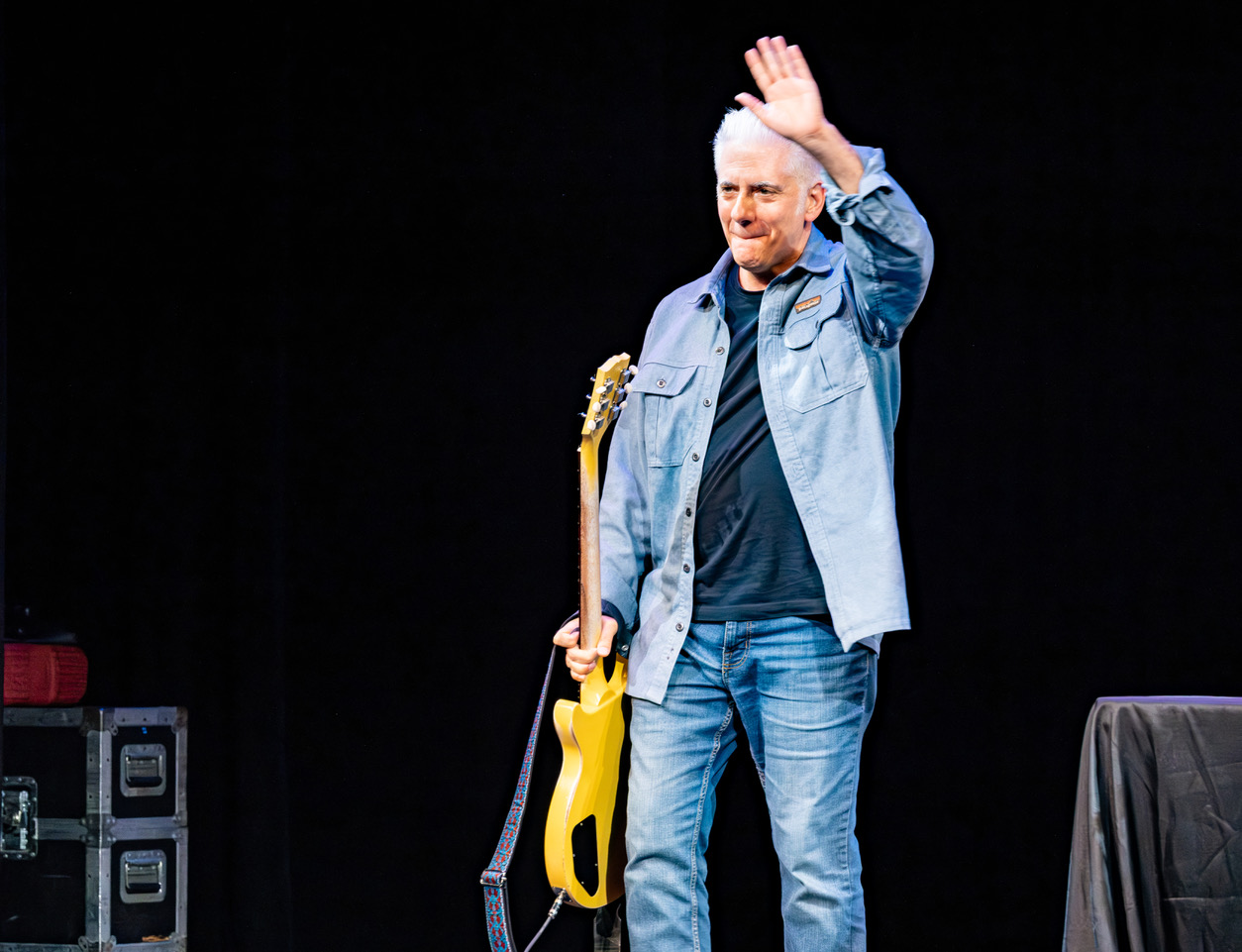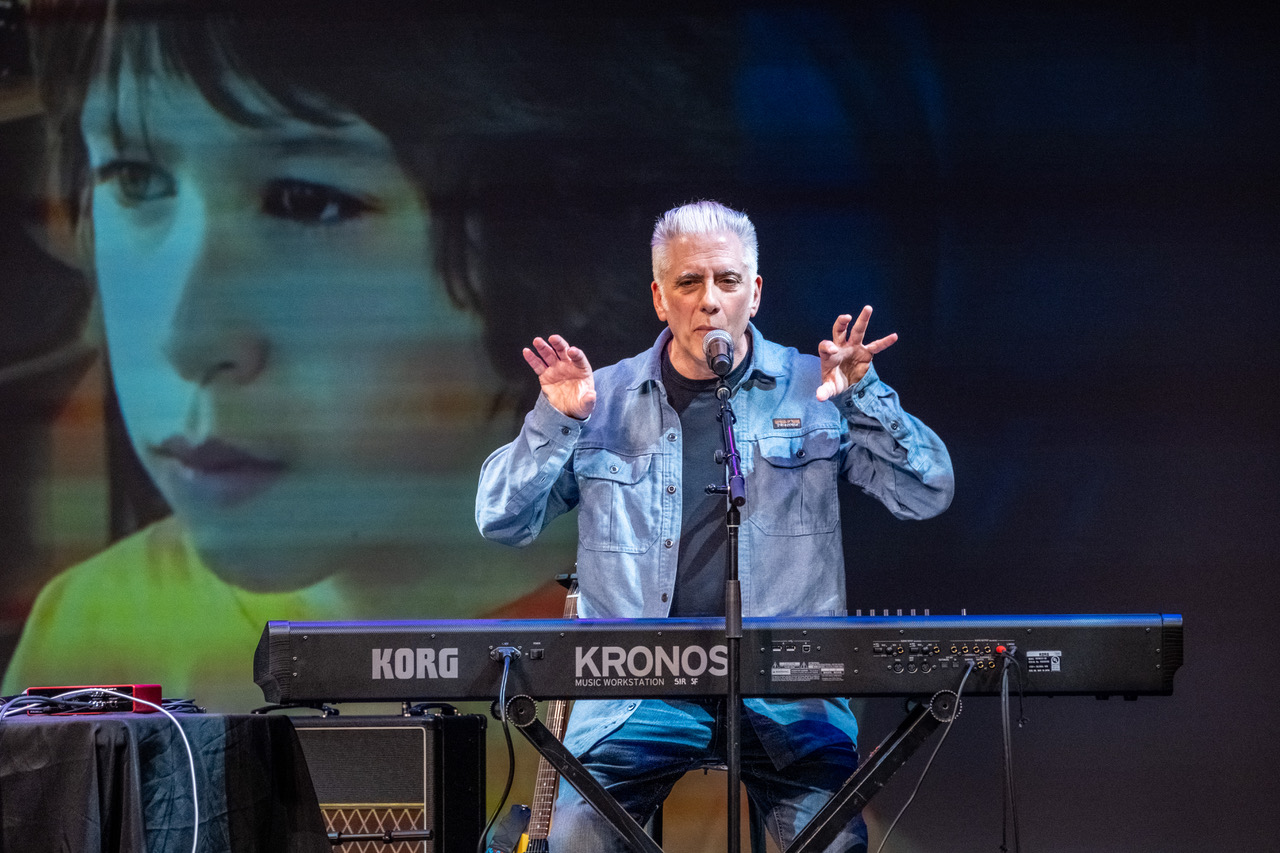Rick Beato
Presidio Theater
September 25, 2025
Photos by Steve Roby
For his sold-out Bay Area debut, Rick Beato transformed San Francisco’s Presidio Theatre into a two-hour crash course on how music works today—stories from the road and the studio, a candid look at AI and the industry, a live “What Makes This Song Great,” and an open Q&A.
Rick Beato didn’t act like a professor. He stepped in with the quiet confidence of a bandleader, thanked the full room, and started a lively video montage—clips featuring Sting, Glyn Johns, and Rick Rubin—that immediately set the mood: conversations straight from the source, delivered without fuss.

From there, he built a life in music with straightforward determination. The childhood seed was curiosity—“that’s when I learned that lesson: knowledge has value”—followed by the summer he broke his foot in eighth grade and decided to teach himself guitar. Already fluent on school-orchestra cello and upright bass, he bought a worn-out Gibson for $300 and never looked back. The picture was clear and simple: a crowded house, practice on the front steps, and a teen turning free time into a lifelong drive.
The path that led him took him through orchestra pits, jazz clubs, and control rooms before reaching YouTube. Beato described the Seashore Test, which guided him from cello to bass, and the shock of hearing Brandenburg No. 3—early ear training that still influences how he listens. The middle years weren’t romantic: lean periods as a working jazz musician, a shift to songwriting and producing, the Napster shock that forced artists to self-fund, and, ultimately, a channel focused on translating complex ideas into clear, accessible language. Family photos and home movies rooted the journey in something human.

Clarity is the goal. Beato breaks down harmony and arrangement without losing their edge, showing how players make small decisions that become the parts you hum on the drive home. That’s why his live rooms stay focused: he doesn’t gatekeep; he deconstructs.
The heaviest lift of the night—by design—was AI. Beato walked through what the current tools can produce, where they fall short, and why economics will shape adoption more than novelty will. He demonstrated “Walking Away,” a song co-composed for a CBS Saturday Morning segment featuring a fictional AI artist, Sadie Winters—an experiment that later went viral and took on a life of its own online. The framing was practical rather than alarmist: AI will change workflows; taste and judgment still win. “Even though AI will take people’s jobs, the ones who succeed in music will still be the ones who succeed,” he said. “You can create all this AI-generated music—but how do you know which parts to change? Is the melody actually better?” He also nodded to headline-level litigation numbers as a sign of the fights ahead over credits and royalties.
The Q&A kept the same leisurely tempo—gear, influences, future recordings. Asked how many guitars a person should own, he deadpanned the line everyone in the room could finish: “You can never have too many!” He sketched the backstory of his 2021 Gibson signature model and the donation that followed to Save the Music, underscoring the community loop that powers his brand.

Before the lights came up, he shared a wish-list of future interviews—Angus Young, Paul McCartney, Keith Richards (or Mick and Keith together), Robert Plant—and added that he also wants to spotlight younger players. He noted, by his count, that his channel reaches on the order of 350–500 million views per month, a reminder of the scale behind his “teacher in the room” persona.
As a night out, the event sat between masterclass and town hall; as a debut, it showed why Beato has become a reliable translator of the music world’s moving parts. You left with a few quotable lines, a sharper ear, and a workable lens for thinking about the next wave—art, tech, and business included.


